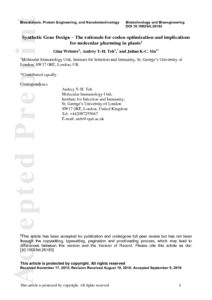Webster, G; Teh, AY-H; Ma, JK-C
(2017)
Synthetic gene design - The rationale for codon optimization and implications for molecular pharming in plants.
Biotechnology and Bioengineering, 114 (3).
pp. 492-502.
ISSN 0006-3592
https://doi.org/10.1002/bit.26183
SGUL Authors: Teh, Yi Hui
![[img]](https://openaccess.sgul.ac.uk/108288/1.hassmallThumbnailVersion/Webster_et_al-2016-Biotechnology_and_Bioengineering.pdf)  Preview |
|
PDF
Accepted Version
Available under License ["licenses_description_publisher" not defined].
Download (674kB)
| Preview
|
Abstract
Degeneracy in the genetic code allows multiple codon sequences to encode the same protein. Codon usage bias in genes is the term given to the preferred use of particular synonymous codons. Synonymous codon substitutions had been regarded as "silent" as the primary structure of the protein was not affected; however, it is now accepted that synonymous substitutions can have a significant effect on heterologous protein expression. Codon optimization, the process of altering codons within the gene sequence to improve recombinant protein expression, has become widely practised. Multiple inter-linked factors affecting protein expression need to be taken into consideration when optimizing a gene sequence. Over the years, various computer programmes have been developed to aid in the gene sequence optimization process. However, as the rulebook for altering codon usage to affect protein expression is still not completely understood, it is difficult to predict which strategy, if any, will design the 'optimal' gene sequence. In this review, codon usage bias and factors affecting codon selection will be discussed and the evidence for codon optimization impact will be reviewed for recombinant protein expression using plants as a case study. These developments will be relevant to all recombinant expression systems, however, molecular pharming in plants is an area which has consistently encountered difficulties with low levels of recombinant protein expression, and should benefit from an evidence based rational approach to synthetic gene design.
| Item Type: |
Article
|
| Additional Information: |
This is the peer reviewed version of the following article: Webster, G., Teh, A. Y.-H. and Ma, J. K.-C. (2016), Synthetic gene design – The rationale for codon optimization and implications for molecular pharming in plants. Biotechnol. Bioeng., 114: 492–502. Accepted Author Manuscript, which has been published in final form at http://dx.doi.org/10.1002/bit.26183]. This article may be used for non-commercial purposes in accordance with Wiley Terms and Conditions for Self-Archiving. |
| Keywords: |
Synonymous codons, genetic code, heterologous protein expression, Synonymous codons, genetic code, heterologous protein expression, Biotechnology, MD Multidisciplinary |
| SGUL Research Institute / Research Centre: |
Academic Structure > Infection and Immunity Research Institute (INII) |
| Journal or Publication Title: |
Biotechnology and Bioengineering |
| ISSN: |
0006-3592 |
| Language: |
ENG |
| Publisher License: |
Publisher's own licence |
| Projects: |
|
| PubMed ID: |
27618314 |
| Dates: |
| Date |
Event |
| 2017-01-23 |
Published |
| 2016-09-12 |
Published Online |
| 2016-09-05 |
Accepted |
|
 |
Go to PubMed abstract |
| URI: |
https://openaccess.sgul.ac.uk/id/eprint/108288 |
| Publisher's version: |
https://doi.org/10.1002/bit.26183 |
Statistics
Item downloaded times since 12 Oct 2016.
Actions (login required)
 |
Edit Item |



